BBC's Blog, page 10
October 4, 2013
What's on BBC Red Button 5-11 October
1Xtra goes on tour this week and you can get the best seat in the house thanks to Red Button. We’ve also got a Maida Vale session from the legendary Pixies and comedy highlights Fresh from the Fringe. As always, there’s plenty of sport on offer too, with live coverage from the Korean Grand Prix, highlights from the World Gymnastics Championships and a special 90th birthday tribute to the inimitable Murray Walker.
1Xtra Live

1Xtra Live - Rudimental
Join 1Xtra Live’s four-day celebration of the best in live RnB and hip-hop, visiting Bournemouth, London, Liverpool and Leeds with artists including Rudimental, Sean Paul, Sub-Focus and Robin Thicke
Mon 7 October 7pm – 12 midnight
Tue 8 October 7pm – 12 midnight
Wed 9 October 7pm – 12 midnight
Thu 10 October 7pm – 12 midnight
Pixies on 6 Music

6Music - Pixies at Maida Vale
Legendary rockers, the Pixies, talk about their first new music in 20 years and play at the BBC’s Maida Vale Studios, introduced by Steve Lamacq.
Fri 11 October 12 midnight – Sat 12 5.20am
Fresh from the Fringe
There’s still plenty of time to see our pick of the people who made us laugh this August. Mark Watson hosts a showcase of exciting up-and-coming comic talent fresh from the Edinburgh Fringe Festival recorded at Bush Hall in London.
Sat 5 October 8.55am – 1.30pm
Sun 6 October 12 noon – 2pm
Tue 8 October 12 noon – 7pm
Wed 9 October 12 midnight – 7pm
Thu 10 October 12 midnight – 11am
Thu 10 October 1pm – 3pm
Thu 10 October 4pm – 5pm
Antiques Roadshow Play Along
Demonstrate your knowledge of antiques by playing along with Antiques Roadshow. Our valuation game is simple, fun and free to play. Consider each of the objects featured in the programme, select an option before our experts give their valuation and see how many you get right.
The play along is not available on Virgin TiVo but remember you can also download the BBC’s free mobile play along app.
Available on Sky and Freeview
Sun 6 October 7.55pm – 9pm
This Week’s Sport Highlights
Catch highlights from the World Gymnastics Championships, all the action from the F1 Grand Prix in Yeongam from Saturday, the rugby Super League Grand Final and the unmissable tribute to Murray Walker, in honour of his 90th birthday. For a full list and times of sport coverage on Red Button see the BBC Sport website. Please note times are subject to change.
Don’t forget, you can get more information on BBC Red Button services here and you can keep up with all the latest news by following us on Twitter @BBCRedButton.
October 1, 2013
CBeebies Playtime App on Windows Phone 8
I’m Patrick Healy, Head of Product for Childrens at BBC Future Media, and I’m delighted to share an update about our recently launched CBeebies Playtime app.
In August we released the app on Android, iOS, and Kindle Fire devices and a little over a month later, we’re now launching it on Windows Phone 8 – available to download for free from the Windows Phone Store.
Children’s media consumption habits are changing rapidly, as highlighted by the recent BBC Trust review into children's services, and it’s important for us to be able to reach them wherever they are. As mobile and tablets are now commonly used by children, we wanted to provide a new and exciting way of entertaining and educating them on those devices.
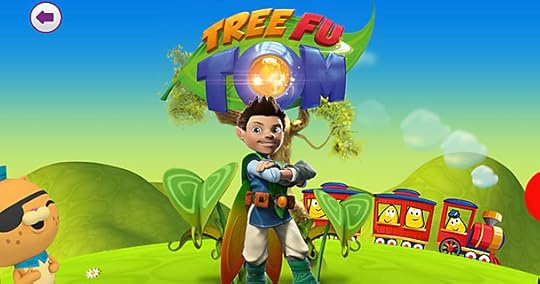
CBeebies Playtime App Hub
To provide the best possible handheld experience, we designed the CBeebies Playtime app to be intrinsically native, allowing us to take advantage of a device’s touchscreen, accelerometer, microphone and other features.
As a result, it’s not possible to offer the same content and experience via a mobile website, so people need to download the app, then tap, swipe, tilt and shout away on device with a supported mobile operating system.
The only way we can bring this content to new mobile audiences is through a new native app, which we’ve done for Windows Phone 8 users in the most efficient and cost-effective way possible.
Our strategy from the start of the CBeebies Playtime build was to use a single codebase which can be branched to target our required mobile platforms. Unity was the technology workflow used, allowing us to develop rich 2D and 3D game experiences that could scale.
With that in place, we were able to render the app to iOS, Android, Kindle and now Windows Phone 8 with relative ease. However, we still needed to address the different performance, memory and screen output capabilities across the platforms. The optimisation of the asset sets became the key endeavour, and we’re happy with the results.
By using the single codebase workflow, we can add further games content and features to these platforms as needed, without the overhead of repeating major work for each platform. This allows us to efficiently maintain as synchronised an approach as possible to the releases in each app store.
We are always looking at different platforms and how they evolve. With CBeebies Playtime we are well placed to respond quickly to the introduction and uptake of new technology.
Please do take a look at the app and leave a comment.
Patrick Healey is Head of Product for Childrens at BBC Future Media
CBeebies Playtime App on Windows 8 Phone
I’m Patrick Healy, Head of Product for Childrens at BBC Future Media, and I’m delighted to share an update about our recently launched CBeebies Playtime app.
In August we released the app on Android, iOS, and Kindle Fire devices and a little over a month later, we’re now launching it on Windows Phone 8 – available to download for free from the Windows Phone Store.
Children’s media consumption habits are changing rapidly, as highlighted by the recent BBC Trust review into children's services, and it’s important for us to be able to reach them wherever they are. As mobile and tablets are now commonly used by children, we wanted to provide a new and exciting way of entertaining and educating them on those devices.

CBeebies Playtime App Hub
To provide the best possible handheld experience, we designed the CBeebies Playtime app to be intrinsically native, allowing us to take advantage of a device’s touchscreen, accelerometer, microphone and other features.
As a result, it’s not possible to offer the same content and experience via a mobile website, so people need to download the app, then tap, swipe, tilt and shout away on device with a supported mobile operating system.
The only way we can bring this content to new mobile audiences is through a new native app, which we’ve done for Windows Phone 8 users in the most efficient and cost-effective way possible.
Our strategy from the start of the CBeebies Playtime build was to use a single codebase which can be branched to target our required mobile platforms. Unity was the technology workflow used, allowing us to develop rich 2D and 3D game experiences that could scale.
With that in place, we were able to render the app to iOS, Android, Kindle and now Windows Phone 8 with relative ease. However, we still needed to address the different performance, memory and screen output capabilities across the platforms. The optimisation of the asset sets became the key endeavour, and we’re happy with the results.
By using the single codebase workflow, we can add further games content and features to these platforms as needed, without the overhead of repeating major work for each platform. This allows us to efficiently maintain as synchronised an approach as possible to the releases in each app store.
We are always looking at different platforms and how they evolve. With CBeebies Playtime we are well placed to respond quickly to the introduction and uptake of new technology.
Please do take a look at the app and leave a comment.
Patrick Healey is Head of Product for Childrens at BBC Future Media
Testing BBC iPlayer Release For Android Downloads
Hello, I'm Paul Rutter, Test Manager for POD Test in Mobile Platforms, Programmes and On-Demand, BBC Future Media.
My team and myself are based in the great new buildings in MediaCity here in Salford.
In my team we look after testing for the following products:
- BBC iPlayer native applications on iOS and Android
- BBC iPlayer Radio native applications on iOS and Android
- BBC Media Player native application on Android
- We also worked on the Antiques Roadshow playalong app and provide support to other component level products built within the team.
I'd like to describe how we went about testing the latest release of BBC iPlayer on Android. Version 2.0, which introduced support for downloads.

Some of the Android devices used in testing
Team structure
In the Test team we have Test Engineers and Developers-in-Test who are embedded in the Agile development team, sitting alongside developers and the rest of the project team.
We also have the ability to add additional test capacity through an external supplier, which enables us to run iterative regression testing rounds and schedule larger regression testing rounds in a shorter time period.
For this release Test resource consisted of 3 embedded Test Engineers and 1 Developer-in-Test.
Device coverage
Our Android products are installable on over 3000 different devices from the Google Play store. Obviously we can't possibly test on all these devices otherwise we'd never get round to releasing anything - so we prioritise testing based on stats from audience use, which gives us our most popular devices.
In addition the Product team chose to focus support for the downloads feature to a finite list of 13 prioritised devices which would be whitelisted at launch. This further narrowed down our focus for device coverage with the aim of delivering the release within an acceptable time period.
All Mobile Platforms hardware is SIM free and without operator customisation.
BDD and automated testing
We followed Behaviour Driven Development (BDD) methodology.
This allowed us to take a Feature with Acceptance Criteria and, during a "three amigos" session, flesh out into scenarios in a Given, When, Then format.
These Scenarios can then be implemented as automated tests or left as manual tests. Deciding which scenarios to implement was based on discussion around the Cost (complexity of implementation) against the Value (project or product).
Automated Tests were integrated into our Continuous Integration build process and run against the Android emulator.
In addition, the Feature files built up into a living requirements specification of the product.
Feature testing
A user story describes a feature which the team want to implement. Once the Feature has been through the "three amigos" process it is ready to pull into a Sprint. The feature is then implemented by a developer, along with any automated tests - and then tested by a tester against the Acceptance Criteria. Based on this tickets move across our task board getting closer to 'done'.
If the feature passes testing then the ticket is closed out and moved to 'done'. Any manual test cases for that feature are added to our Test Case Management System.
If Testing demonstrates the feature isn't implemented as expected the tester will either fail the ticket and move it back to in-progress, or may (after discussion with the Product Owner) move it to 'done' and raise a defect or new story as necessary.
For feature testing we tested on one Phone and one Tablet from our prioritised list of devices to support downloads.
Iterative regression testing
At the end of a development sprint a sprint build was released to the external test team together with details of the last sprint's stories and what devices were used for testing. The external test resource performed a round of regression testing covering functionality of the last sprint's stories and integration with existing functionality, execution of P1 tests and exploratory testing across different devices from the prioritised list. At the end of the next sprint the process is repeated.
Why?
- Test early! One of the fundamental rules of testing. Discovering issues sooner rather than later is always a good thing.
- Faster feedback to the development team around problem areas.
- Achieve greater device coverage sooner in the process – testing across more devices sooner rather than waiting for a pre-release regression round.
- Increase product knowledge in the Test team – giving the off-shore team early insight into the new functionality that we were building.
- Gain confidence in the product – more testing, testing sooner, more runtime of the builds and more feedback.
- By increased testing sooner we expect to decrease the likelihood of finding unknown issues in Release Candidate regression rounds.
Bugs!
Following the above the test team identified and logged 206 defects in total prior to reaching our Release Candidate. 81 of these were Severity 1 defects and were prioritised for fixing throughout the development period, prior to launch.
Release Candidate regression testing
Once the team had completed all in-scope functionality a Release Candidate (RC) build was created.
The team worked together to plan a full regression testing round across all 13 prioritised devices, plus regression testing on non-whitelisted devices (does the original functionality still work?) and negative testing on non-whitelisted devices (confirmation that we are we not seeing the downloads option where we expect to).
This initial round of testing came in estimated at around 60 man days! We managed to complete it in 2 working weeks. This was achieved by prioritising which tests/devices to execute first, by using the external test resource and by having developers change their hats and become a Tester for a few days!
This full round of regression testing resulted in 53 defects being logged but only 4 being prioritised as showstoppers by the product owner David Berlin.
Once the 4 issues were fixed and re-tested we had a new Release Candidate.
Working with the development team we talked around each issue and fix, understanding the risk to the application and where we might want to focus our testing. Having this information is vital and allowed a risk-based approach to be taken for the second round of regression testing - which was much lighter touch and completed in just a couple of days.
Following this the team had a Release Board meeting where stakeholders meet to review output of regression testing, discuss confidence in the build and ultimately decide whether to release or not!
Internal Beta testing
In addition to Testing within the Mobile BBC iPlayer team we also ran an internal Beta trial. So once we had our first RC we were able to offer that to our internal audience within Future Media. This is around 1400 people and, assuming they're Android users, allows them to install the build, play with it and provide direct feedback.
This is beneficial in many ways:
- Provides increased runtime of the applications
- Greater and varied device coverage
- Direct feedback to the development team
- Greater 'in the wild' testing
Defect Management
Defects are logged with standard good testing practice to include details on build, device, environment, screenshots, crash logs and steps to reproduce. In addition we set a Severity value (1 - 4). This then feeds into a defect triage meeting with a representative from Test, Development and Product review any new defects. Based on severity, explanation from Test and understanding on difficulty to fix and risk to the application from Dev, the Product representative can set a priority for fixing the defect.
The Test team advise at the end of stand-up each day whether there is enough new, or high severity defects to warrant a defect triage meeting. These are booked in daily but happen on an as needed basis.
Tools and technologies
We use various tools and technologies in the team, including:
- Jira (project and defect management)
- Confluence (documentation and knowledge sharing)
- Testrail (test case management and manual and automated test execution)
- Calabash, Ruby, Cucumber (Open source automated Test tools, frameworks and languages)
- Charles (for network monitoring and manipulation)
- The Android SDK
- Eclipse, Sublime Text 2 and IntelliJ (IDEs and text editors)
The People
Last but by no means least, the most important part of all of this are the great bunch of highly skilled, enthusiastic, expert Test Engineers and Developers-in-test who love their product and routinely go above and beyond to improve the experience for our audience.
What went well?
Many of the team had worked on the downloads release of iOS BBC iPlayer so came with lots of experience and lessons learnt. Testing features against a single phone and tablet rather than all supported devices enabled us to get tickets tested quicker, with faster feedback to the Developers and Product Owner and faster progress across the board.
The iterative regression testing rounds were very successful and enabled the team to get earlier visibility of defects and earlier prioritisation of these by the Product Owner for fixing - as well ad greater device coverage earlier in the project.
Regular defect triage! Regular (often 3 or more times a week) review and discussion of new, yet-to-be-prioritised defects for the project was invaluable. Fixes got prioritised and went in sooner in a more timely fashion. Don't sit on and build up an unhealthy defect debt.
What didn't go so well?
Adopting BDD is a hurdle and there's certainly an initial uphill 'lump' to get over before the team start feeling the benefit of the process. However, having the three amigo review of a feature before it hits development was eventually seen as very worthwhile.
Most of our testing is performed on latest builds following a fresh install. This means we don't get much time to 'soak test' on a specific build for a number of days. This has meant in the past it's been difficult to uncover memory handling issues. In addition, we rarely watch programmes for the full length of the show (like a user would). This led to us not being fully aware of a memory leak issue affecting playback of downloaded content on certain lower memory devices where playback could crash at around 60mins of playback. This was discovered by members of the team using the device in their own time outside of the office.
On the day we were hoping to release the application David Berlin discovered a show-stopper issue (in a real world use case on the London underground) around locking and unlocking the device during playback. This was so significant it ultimately resulted in two of our 13 prioritised whitelisted devices being removed for downloads at launch. This issue will be fixed with a subsequent patch fix.
Needless to say the edge cases and real-world issues mentioned above are now covered by formal Tests within our Test suite.
I hope you enjoyed an insight into the Test effort that goes into supporting one of our major releases and if you have any questions don't hesitate to ask in the comments section.
Paul Rutter is Test Manager for POD Test in Mobile Platforms, Programmes and On-Demand, BBC Future Media.
September 30, 2013
College of Production Round Up: Earth Unplugged
The BBC College of Production (CoP) website is a free online learning resource for the radio, television and online production communities offering videos, podcasts and articles from broadcasting innovators and experts.
This week, one assistant producer’s journey from traditional TV to YouTube, how a West London community station is reaching its audiences through new digital platforms, and how to choose and use the perfect image online in the return of our Twitter Q&As. Plus some thoughts on innovative online audio from this year’s Next Radio ideas conference.
A Pereguine falcoln chasing a world champion mountain biker, slow motion filming of Shaolin warriors and what would happen if a whale swallowed you - these are just a few of the videos featured on Earth Unplugged, the BBC’s first original content YouTube channel. It’s the home of assistant producer Nicola Brown and it’s quite a different production culture from traditional television. Teams are smaller, roles wider but the digital platform allows an unparalleled degree of creativity and collaboration.
In her article she talks not only about the creative and production process but also the effort needed to successfully launch a YouTube video. “My biggest surprise has been how much strategy and planning goes into making videos work well on the YouTube platform. And just how much impact social media can have on getting your content out there and viewed.”
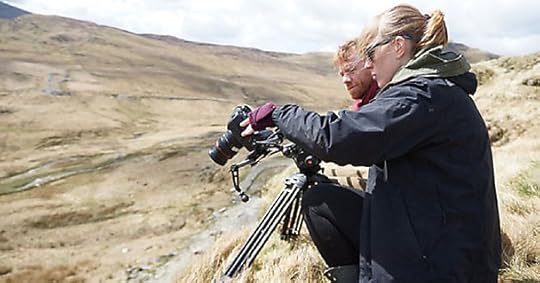
Nicola Brown on location for Earth Unplugged
From reacting to listeners through Twitter, Instagram and Facebook, to writing blogs and online articles, recording and editing audio and creating video for YouTube – radio is no longer just about live broadcasting and at community station Bang Radio their small but dedicated volunteer content team are doing it all.
In the first of a series of films coming up on the BBC College of Production site, exploring how community radio is innovating with new forms of programme making, content team intern Drusilla Lartey talks about the skills you need to reach out to audiences in the local community. “Good writing. Good social skills. Good communication" - skills that are invaluable for wherever you work in the multiplatform world of radio.
The subject of how online connectivity is changing the way radio is broadcast is a common theme in our podcast from the recent Next Radio conference with presenters, producers and digital content creators all talking about innovative radio in a digital world. Subjects include broadcasting from anywhere in the world via a smartphone app and creating the online musical extravangza that was this year's BBC coverage from Glastonbury.
It is said that picture can speak 1000 words and the importance of the image has never been so pronounced than in the highly competitive online world. A carefully chosen and well edited picture is key to drawing in your audience online, especially when they may be stumbling across you on a smartphone or tablet.
This is the subject of our Twitter Q&A, how to choose and use images online, with experienced creative producer and picture editor Sam Adam on Tuesday 1 October 1-2pm. If you have any questions you’d like us to answer in the session don’t hesitate to tweet @BBCCoP using the hastag #CoPWorkshop. And as always, we’ll Storify the conversation so that you can go back to it at a later date.
Ben Toone is an Assistant Content Producer at the BBC College of Production website
Podcasts in the BBC iPlayer Radio App
With over 3 million downloads and counting, the BBC iPlayer Radio app (now available on iOS, Android and Amazon devices) is evolving. Since we first launched the app, we’ve been listening closely to audience feedback with a view to make continuous improvements to the apps. I’m proud to say that we’ve now implemented the single most requested new feature – podcast downloads.
This means that you can grab a copy of your favourite podcasts to listen to on or offline, straight from the app. We’ve added simple controls to choose whether to allow downloads when on mobile networks or just on WiFi (to avoid data charges), to ‘queue’ as many downloads as you like, and to manage your downloaded content quickly and easily via the new ‘My Downloads’ section of the app. You’ll find this new section in the ‘More’ menu on iOS devices, and in the main menu on Android and Amazon devices. Android users will also be able to keep a clear overview of download activity along with a quick play option via the notifications bar.
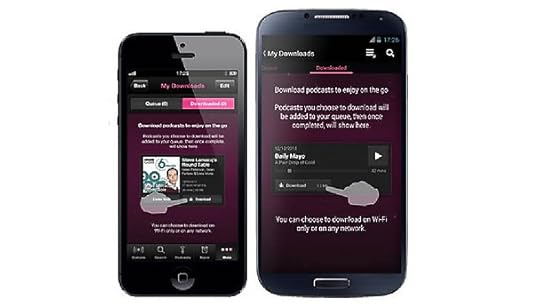
Podcasts in the BBC Radio app
You can choose from a plethora of podcasts so whether you like to listen to scintillating science programmes, new or archive Desert Island Discs, the best of this week’s comedy, the latest news and reviews, sport highlights or hot new music suggestions from your favourite DJs – you will find something to engage your eardrums whether you have mobile signal or not.
I’d love to hear your feedback, via app store comments, our twitter account (@BBCiPlayerRadio) or by email ([email protected]) or by comments on this post.
Happy listening!
James Simcock is Executive Producer Mobile, BBC Radio & Music Interactive
September 27, 2013
What's on BBC Red Button 28 September - 4 October
The Red Button has plenty to offer this week with a packed schedule full of comedy, music and sport. Mark Watson presents some of the best up-and-coming comic talent from the Edinburgh Fringe while the next instalment of Noel’s dossier is released from BBC Two’s The Wrong Mans. Music fans can watch Justin Timberlake’s Live Lounge performance and highlights from the Stephen Lawrence Unity Concert. Plus, there’s lots for sports fans too with Road World Championship cycling, MotoGP and Final Score.
Fresh from the Fringe

Mark Watson presents up-and-coming comic talent from the Edinburgh Fringe Festival
Fresh from the Fringe is our pick of the people who made us laugh this August. Mark Watson hosts a showcase of exciting up-and-coming comic talent fresh from the Edinburgh Fringe Festival which was recorded at Bush Hall in London recently.
You can also listen to different edited highlights on Radio 4, from 6.30pm on Wednesday 2 October and you can watch material from all 12 comics who performed at www.bbc.co.uk/radio4 from Wednesday night.
Wednesday 2 October 6.55pm –6am
Thursday 3 October 6am – 3pm, 4pm – 6am
Friday 6am – 7pm, 10pm – midnight
Stephen Lawrence Unity Concert
Twenty years after the tragic murder which changed race relations in Britain, this event at London’s O2 Arena is in support of the Stephen Lawrence Charitable Trust and is hosted by Nick Grimshaw and Reggie Yates.
We’ll have highlights of the concert on the Red Button starring Ed Sheeran, Ellie Goulding, Emeli Sande, Jamie Cullum, Jessie J, Labrinth, Plan B, Rita Ora, Rizzle Kicks, Rudimental and Tinie Tempah, plus special guests.
Justin Timberlake - Radio 1 Live Lounge

Justin Timberlake performed in the Radio 1 Live Lounge
There’s still chance to see Justin Timberlake exclusively for the BBC at the legendary Radio Theatre in this BBC Radio 1 Live Lounge special, performing his classic songs, tracks from a new album and look out for an amazing Michael Jackson cover.
Saturday 28 September 6am – 11.30am, 6pm – 1.10am
Sunday 29 September 7.15pm – 7.55pm, 9pm – 10.25pm, 12.05pm – 6am
Monday 30 September 6am – 10am, 4am – 6am
Tuesday 1 October 6am – 9.25pm
Wednesday 2 October 7am – 1pm
The Wrong Mans
Get exclusive extra content from new comedy thriller Wrong Mans on Red Button. Each week town planner Noel Ward will release a new dossier of evidence against his colleague Sam Pinkett. Press red for the Noel Truth or catch up at www.bbc.co.uk/thewrongmans
Tuesday 1 October , 9.25pm-11.30pm
Antiques Roadshow Play Along
Demonstrate your knowledge of antiques by playing along with Antiques Roadshow. Our valuation game is simple, fun and free to play. Consider each of the objects featured in the programme, select an option before our experts give their valuation and see how many you get right.
The play along is not available on Virgin TiVo but remember you can also download the BBC’s free mobile play along app.
Available on Sky and Freeview
Sun 29 September, 7.55pm-9pm
This Week's Sport Highlights
There's a busy sport schedule on the Red Button this weekend with MotoGP action from Aragon, both the Men’s and Women’s Road Races from the Road World Championships in Italy and the latest football scores on Saturday afternoon from 3pm on Final Score. For a full list and times of sport coverage on Red Button see the BBC Sport website. Please note times are subject to change.
And don't forget, you can get more information on BBC Red Button services here and you can keep up with all the latest news by following us on Twitter @BBCRedButton.
September 26, 2013
BBC iPlayer Downloads: simpler, more reliable downloads for desktop
Hello, I'm Dan Taylor and I'm the new Head of BBC iPlayer.
I'm passionate about listening to and responding to feedback from users and read the BBC's online feedback log over my breakfast every morning.
The iPlayer feature that has most frequently appeared in this log has been our desktop downloads solution, BBC iPlayer Desktop. Many of you have not been happy with the service, so one of my first jobs was to try and implement a solution. Today, I'm pleased to announce the release of a new desktop downloads solution, BBC iPlayer Downloads, which aims to address the underlying cause of many of those issues.

BBC iPlayer downloads in action
BBC iPlayer Desktop relied on users downloading and installing Adobe AIR. Unfortunately updates to this underlying technology often resulted in issues with the BBC iPlayer Desktop, with users reporting that they had lost downloaded programmes and/or were unable to download any new programmes.
BBC iPlayer Downloads doesn't require users to download and install Adobe AIR and consequently, shouldn't be vulnerable to issues resulting from updates to Adobe AIR.
We've also taken the opportunity to simplify the application, focusing it on the core tasks of the download and offline playback of BBC TV programmes. So, for example, we haven't rebuilt the Series Record functionality in the new application, which introduced significant complexity and was only used by a minority of users. Similarly, we haven't rebuilt the Live TV and Live Radio areas, which couldn't be used offline and duplicated functionality on the BBC iPlayer website (minus great new features like Live Restart).
The Parental Guidance Lock has been integrated with the BBC iPlayer website (so you don't have to set it up twice, or remember two separate passwords) and is now triggered at the point of download rather than playback.
We've also simplified the download mechanism on the website so it's less vulnerable to browser updates and we've consolidated the download links so they now only appear on episode pages, in line with the download experience in our mobile applications.
Unfortunately, we've had to discontinue downloads in the Windows Media format as it was no longer cost-efficient to produce these downloads.
I appreciate some users will miss these features but I hope you'll agree that having a more reliable download solution is worth the trade off.
From today, it will no longer be possible to download the old BBC iPlayer Desktop client but any programmes already downloaded should continue to be playable until they reach their natural expiry date.
More information on installing and using BBC iPlayer Downloads can be found on our Help pages.
Do let me know what you think of BBC iPlayer Downloads in the below comments and don't forget you can also download programmes using our mobile and tablet applications.
To preempt a likely question ("What about downloads for radio?"), the good news is that the BBC Trust recently approved proposals from the BBC Executive to offer BBC radio content for download and we hope to roll out downloads for radio in 2014.
Dan Taylor is Head of BBC iPlayer, BBC Future Media
September 24, 2013
Crowdsourcing the World Service Radio Archive: an experiment from BBC R&D
The BBC World Service Archive prototype allows you to search, browse and listen to over 36,000 radio programmes from the BBC World Service archive spanning the past 45 years. For a limited time you can explore this archive and help us improve it by validating and adding topic tags that describe the programmes. You just need an email address to register for the prototype.
I work for the Internet Research and Future Services team in BBC R&D and for the last few months we have been running an experiment on how to put a large media archive online using a combination of algorithms and people. With your help we aim to comprehensively and accurately tag this collection of BBC programmes. This video explains how:
In order to see this content you need to have both Javascript enabled and Flash Installed. Visit BBC Webwise for full instructions. If you're reading via RSS, you'll need to visit the blog to access this content
A guide to using BBC R&D's World Service Archive prototype.
The BBC, and many other organisations, have massive archives of TV and radio but it is expensive to put them online in a navigable, findable way so we are researching ways to make it cheaper and easier. R&D is pioneering ways of generating metadata for programmes automatically using innovative algorithms that can "listen to" and tag programmes with topics and speakers.
The World Service Archive prototype is an experiment to apply this research to a real-world archive, and then to improve the results using crowdsourcing. We want to learn about how good the algorithms are, whether and how people tag, and how to combine algorithms with people.
The archive problem
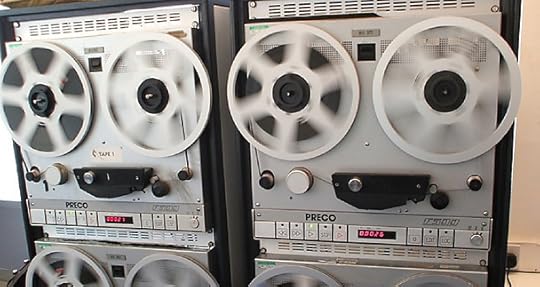
Digitising programmes in the archive
Between 2005 and 2008 the BBC World Service digitised the contents of its recorded programme library. This included programmes archived from the English-language radio services over the past 45 years - over 50,000 programmes (of which 36,000 factual programmes were available to put online - see footnote) covering a wide range of subjects from weekly African news reporting the civil war in Sierra Leone as it happened to interviews with Stephen Spielberg.
The digitisation project was a great success but the metadata was of limited quality and quantity. Metadata is data to describe digital media items and without it content is hard to find and navigate around. So although we might have had a programme title and broadcast date we didn't really know what each programme was about without listening to every one - or indeed know the shape and contents of the whole archive. In 2012 the World Service and engineers from BBC Research & Development joined together to demonstrate a way to put massive media archives online using a combination of computers and people. We thought we could use advanced algorithms to listen to all the programmes in the archive, automatically generate metadata, use this data to put it online and then ask listeners to validate and improve it.
R&D's solution
We ran the audio through an automated speech-to-text process and this generated fairly noisy transcripts with lots of errors. So we used robust algorithms that we had developed for this purpose to extract key topics from each programme, using Linked Data to ensure each topic is unambiguous and linked to the web. In total we created around 1 million topics, about 20 per programme. You can read more about the technology we used on the R&D blog.
Although the results were fairly good, the automatically generated topic tags for programmes were often wrong - the computers aren't really listening to and understanding the programmes. But we thought that these automatically generated tags, together with the original metadata, were good enough to design and build a browsable and searchable website for the archive. Listeners could use this online prototype and help improve it by validating the automatically generated data and adding their own - "crowdsourcing" the final part of the problem.
Registered users of the experiment can now search, browse and listen to the programmes in the archive, vote on whether automatically generated tags are correct, add their own tags and even correct errors in the programme titles and synopses. You can read more about the latest crowdsourcing features on the R&D blog.
Progress so far
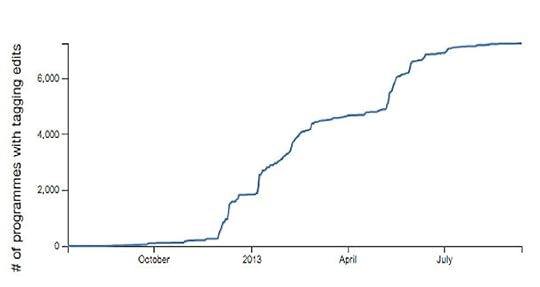
Programmes tagged over time
So far, users of the prototype have listened to around 12,000 of the 36,000 programmes that are available and tagged or edited about 7,000 of these. This has generated over 70,000 individual metadata "edits" (votes, new tags etc). We've even had some dedicated listeners send us recordings of programmes that were missing from the archive. We are currently analysing the data so far to see how good the tags are by comparing professional archivists, listeners and our algorithms. We're also interested in what the most common tags are, what kind of tags are added by people (are they more often people, events or places?) and which kinds of programmes are most popular.
We want your help!
Could you help us do more? The World Service archive is being made available online for a limited time while we conduct this experiment and we want to get as much data as possible. Try finding the oldest programme we've got, look for old episodes of your favourite programmes, see how we can identify individual journalists speaking on From Our Own Correspondent or just explore the archive:
Footnote: Some of the audio in this experiment is unavailable due to rights considerations. This mainly affects programmes with drama, readings, comedy performances, music or sport. Although you cannot listen to these programmes they all retain a page in the prototype that describes them. The original digitised archive only contained pre-recorded programmes, so there are no news bulletins present.
Tristran Ferne is Executive Producer, IRFS, BBC R&D
September 20, 2013
What's on BBC Red Button 21-27 September
Music fans are in for a treat on Red Button this week as Justin Timberlake performs his big hits and tracks from a new album in the Live Lounge, and we also join Hugh Laurie as he examines the influence of the blues on pop music. Then at the weekend you can catch the F1 Highlights from Singapore and the World Cycling Road Championships.
Hugh Laurie's Blues Changes

Hugh Laurie's Blues Changes
Actor, comedian and musician Hugh Laurie with his acclaimed Copper Bottom Band examines the ways in which the blues has influenced the types of music that we listen to today.
Monday 23 September, 7:25pm-4am
Radio 1 Live Lounge
Don't miss Justin Timberlake exclusively for the BBC at the legendary Radio Theatre in this BBC Radio 1 Live Lounge special, performing his classic songs, tracks from a new album and an amazing Jackson cover.
Friday 27 September, 6am-7:30pm, 10pm-6am
Radio 3 Live In Concert
Join the BBC Concert Orchestra from Monday as they play European film music, including excerpts from The Artist and Les Miserables, together with music composed by Maurice Jarre and Ennio Morricone, live from the Watford Colosseum.
Saturday 21 September, 12pm-2:30pm
Sunday 22 September, 12pm-1:30pm
The Wrong Mans

The Wrong Mans
Get exclusive extra content from new comedy thriller Wrong Mans on Red Button. Each week town planner Noel Ward will release a new dossier of evidence against his colleague Sam Pinkett. Press red for the Noel Truth or catch up at www.bbc.co.uk/thewrongmans
Tuesday 24 September, 10pm-4am
Wolfblood Extra
CBBC's hit drama series Wolfblood is back, and BBC Red Button celebrates its return with an exclusive behind-the-scenes special. See how the programme is filmed, watch interviews with all the cast and get an exclusive on-set report from Dodge as he sniffs out all the Wolfblood gossip.
Also from CBBC, there's a blog from presenter Chris, horoscopes and jokes to make you laugh.
Saturday 21 September, 10:55am-12pm
Sunday 22 September, 6:10pm-7:55pm
Elton John
You can still catch highlights of Sir Elton John's special concert for BBC Radio 2. The music legend performs hits from his back catalogue as well as new tracks from his 30th solo album, The Diving Board, in an intimate gig recorded at London's BBC Radio Theatre.
Wednesday 25 September, 4am-6am, 6am-12:15pm, 1:40pm-7:30pm, 10pm-6am
Thursday 26th September, 6am-12pm, 1pm-9pm, 9:30pm-6am
Antiques Roadshow Play Along
Demonstrate your knowledge of antiques by playing along with Antiques Roadshow. Our valuation game is simple, fun and free to play. Consider each of the objects featured in the programme, select an option before our experts give their valuation and see how many you get right.
The play along is not available on Virgin TiVo but remember you can also download the BBC’s free mobile play along app.
Available on Sky and Freeview
Sun 22 September, 7.55pm-9pm
This Week's Sport Highlights
There's a busy sport schedule on Red Button this weekend with highlights from the F1 in Singapore and live action from the World Cycling Road Championships. For a full list and times of sport coverage on Red Button see the BBC Sport website. Please note times are subject to change.
And don't forget, you can get more information on BBC Red Button services here and you can keep up with all the latest news by following us on Twitter @BBCRedButton.
BBC's Blog
- BBC's profile
- 28 followers



